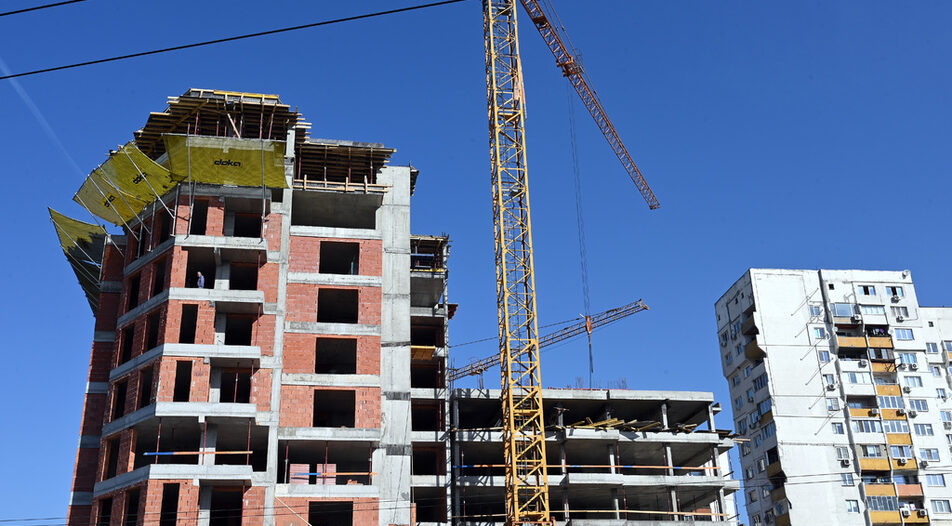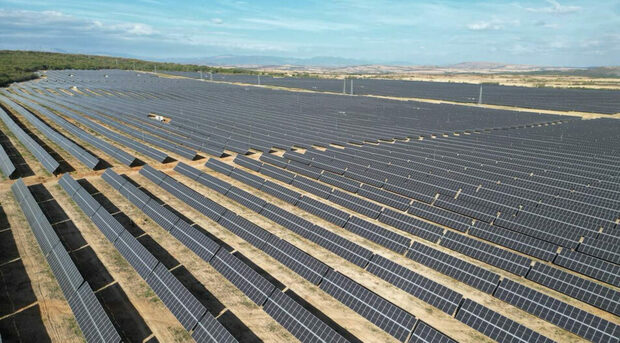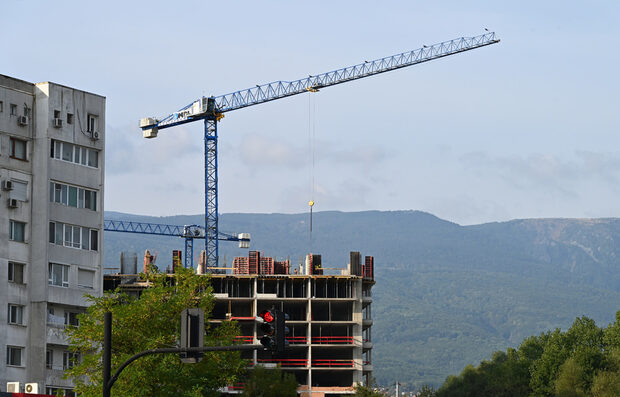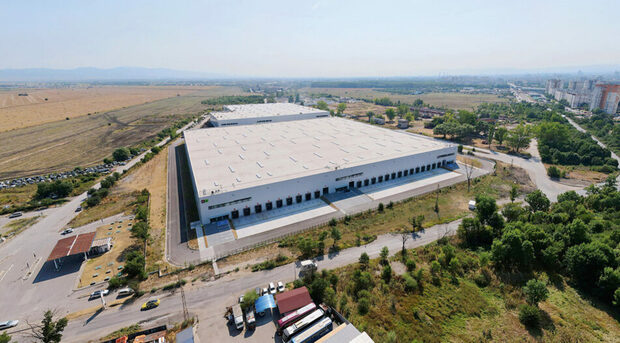The continuing rise in housing prices in Bulgaria doesn't stop people buying property. Since the beginning of the year, price growth has even accelerated. In the first quarter, transactions in the country were 10% more than in the same period of 2021. And 2021 was the strongest year for the market in more than a decade. The deals in big cities such as Sofia, Varna and Burgas exceed in number even those of 2008 which was a record year.
"It is true that we expected a market similar to the one in 2021. But we also expected cooling due to the European Central Bank's (ECB) position to raise interest rates after the third quarter. But high inflation made people rethink their views on their savings," says Dobromir Ganev, chairman of the National Real Estate Association and manager of the Foros agency.
Statistics confirm that the market is hot. Sceptics say that it will be the last time that the market is growing like this". Optimists argue that there are no clear signs of a reversal of the trend yet. The April data of the property website ocenime.bg show a slowdown in real estate transactions throughout the country, especially in Sofia and Varna, where the prices are the highest.
The slowdown does not necessarily mean a steady outflow of buyers. It happens in conditions of limited supply of properties, difficult choices and also uncertainty about the economy after the war in Ukraine. That's why some potential buyers temporarily postpone their purchase or are cautious about investing in off the plan deals.
An unparalleled situation
"The market situation is unprecedented - we have higher property prices, but households have good incomes and favourable bank financing available, while supply is limited," explains Polina Stoykova, executive director of Bulgarian Properties agency.
The real estate sector tends to believe that the market is now reaching equilibrium at a higher price level. "In the next few years, the market will function in an environment different from the typical for the last decade. This is because of inflation outpacing the growth of real estate prices, sustainable demand, low nominal interest rates," says Miroslav Vladimirov, a member of the board of directors of real estate agency Era Bulgaria.
Strong demand, weak supply
High demand and limited supply, both fueled by rising inflation, are the main explanation for the current rise in property prices. "Trends continue and, like in the previous 12 months, they show a weaker supply and stronger demand. The sellers continue to control the market," says Strahil Ivanov, manager of Yavlena real estate agency. "High inflation generates a new wave of property purchases for the purpose of investment, while the purchases for own use remain stable and are growing," comments Tihomir Toshev, credit advisor and executive director of Credit Center consulting group.
"Supply is further constrained by owners postponing their property sales and investors postponing their new construction projects as they await clearer timing and pricing prospects. Overall, the market is in a strong shortage of quality primary and secondary offers," says Polina Stoykova. The data of ocenime. bg also confirm this conclusion, mostly for Sofia and Varna.
Prices are rising
According to Bulgarian Properties, in the first quarter of 2022, prices generally increased at a much faster rate than in the previous quarter as a result of accelerating inflation and limited supply. The annual increase in housing prices in Sofia was 17% for January - March 2022, compared to 13% in the last quarter of 2021.
If we add inflation, the situation doesn't look so dramatic. "The real growth in property prices in 2020 was 5.2%, and 4.9% in 2021. The year-on-year increase observed in the last few quarters is comparable to the one from the end of 2016 and the beginning of 2017. In 2016, the increase became more significant - by 5.3%. The difference is that now the price increase takes place amid high inflation and high levels of mortgage lending", says Miroslav Vladimirov from Era Bulgaria.
and will continue to rise
The forecasts are for property prices to continue to rise over the next few years, but at a moderate pace. The Chairman of the Management Board of the Bulgarian Association of Personal Financial Consultants, Stoyne Vassilev, expects a 5% average increase in the price of real estate in the big cities. Tihomir Toshev sees a 10% rise in prices in the four largest cities and an even higher increase for new construction and individual investors. The reasons are the higher prices of construction materials, speeding inflation, and as a result sustainable domestic demand fuleled by desire to protect savings.
In addition, properties are becoming more expensive not only in Bulgaria but also in most European cities.
Incomes catching up with inflation
There are objective prerequisites for the market to allow higher prices. "Most macroeconomic factors affecting the housing market continue to be positive. Incomes are rising. Unemployment remains below 5%. The pandemic is easing. This gives businesses hope for better results and greater confidence for jobs and economic growth," believes Polina Stoykova. Miroslav Vladimirov adds to the growth of incomes negative interest rates on deposits and easier access to credit at historically lowest mortgage interest rates. Another objective prerequisite for sustainable housing demand, he says, is that 48.8% of urban households live in overcrowded apartments, according to 2020 data.
Interest rates will rise
When savings are not enough, people rely on bank lending, and the trends now are for limiting and increasing interest rates. Until recently, the consultants expected the current conditions of " most affordable financing" to continue this year, and to change in the next two or three. However, the European Central Bank took the first steps to raise interest rates earlier than expected - in July, rather than this autumn.
The expectation is for interest rates to rise gradually. "Up to 1-1.5% for 2022 and 2023," says Miroslav Vladimirov. According to his estimates, a 1% increase in interest on loans increases the monthly instalment by between 60 and 80 levs (approx. 30 to 40 euro). This is the case with a newly granted mortgage.
"In the long term, the rise in interest rates will lead to curbing demand for real estate and cooling the market. In addition, the increase in loan rates will also affect the construction sector, which relies on external financing, as off the plan sales are falling due to the increased risks for both sellers and buyers," says Stoyne Vassilev.
Different dynamics in Sofia
Ocenime. bg's data show a slowdown in supply and more time to purchase mainly in Sofia. In April, the average offer price per square meter in the capital was already 1,450 euro. In each of the other three largest cities, it exceeds 1,000 euro per sq.m. The increase in prices is happening at the fastest pace in smaller cities such as Blagoevgrad and Veliko Tarnovo.
"Prices in Sofia are higher compared to other big cities due to the more serious rise in real estate prices in the last five years. Now they are reaching levels that make buyers give up on purchase," says Tihomir Toshev.
"In some larger cities such as Varna, Plovdiv and Burgas, prices grew at a higher rate, but they still have to catch up, although it will be difficult to reach those in the capital. We still remember that in 2007-2008 prices in Varna overtook those in Sofia, but their decline was much greater after that," says Strahil Ivanov.
The future
The rise in real estate prices cannot continue forever and sooner or later the direction will change. The factors to watch for are mortgage interest rates, inflation, construction materials' prices, the war in Ukraine and the pandemic. "All of them collectively and individually will influence both property prices and the buyers' behaviour," says Tihomir Toshev.
"There will probably be a reversal of the cycle and a cooling of the property market, but I don't expect it to happen this year. Rather, I expect a record year in property transactions and mortgage loan withdrawals," he commented.
"This cycle has not reversed yet, and we are monitoring the situation in detail according to the interests of the clients in every city where Yavlena has an office," says Strahil Ivanov.
The continuing rise in housing prices in Bulgaria doesn't stop people buying property. Since the beginning of the year, price growth has even accelerated. In the first quarter, transactions in the country were 10% more than in the same period of 2021. And 2021 was the strongest year for the market in more than a decade. The deals in big cities such as Sofia, Varna and Burgas exceed in number even those of 2008 which was a record year.












